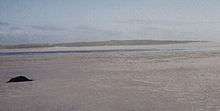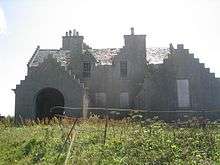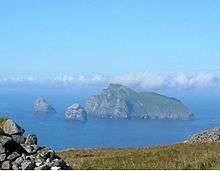Vallay
| Gaelic name | Bhàlaigh |
|---|---|
| Meaning of name | hill island |
| Location | |
 Vallay Vallay shown within the Outer Hebrides | |
| OS grid reference | NF769763 |
| Physical geography | |
| Island group | Outer Hebrides |
| Area | 260 hectares (1.00 sq mi) |
| Area rank | 94 [1] |
| Highest elevation | 38 metres (125 ft) |
| Administration | |
| Sovereign state | United Kingdom |
| Country | Scotland |
| Council area | Comhairle nan Eilean Siar |
| Demographics | |
| Population | 0[2] |
| References | [3][4] |
Vallay (Scottish Gaelic: Bhàlaigh) is an uninhabited tidal island in the Scottish Outer Hebrides. It is linked to North Uist by a long beach at low tide.

Southeast coast of Vallay seen from Solas.

The abandoned house of Erskine Beveridge in July 2004
Once the island supported a population of nearly sixty people, its best-known inhabitant was the archaeologist Erskine Beveridge. The island is also known for its sea birds and for prehistoric monuments.
It is the smallest Scottish island to have an area greater than 1 square mile (2.59 square kilometres).
References
- ↑ Area and population ranks: there are c. 300 islands over 20 ha in extent and 93 permanently inhabited islands were listed in the 2011 census.
- ↑ National Records of Scotland (15 August 2013) (pdf) Statistical Bulletin: 2011 Census: First Results on Population and Household Estimates for Scotland - Release 1C (Part Two). "Appendix 2: Population and households on Scotland’s inhabited islands". Retrieved 17 August 2013.
- ↑ Ordnance Survey. Get-a-map (Map). 1:25,000. Leisure. Ordinance Survey. Retrieved 21 August 2013.
- ↑ Haswell-Smith, Hamish (2004) The Scottish Islands. Edinburgh. Canongate.
| Wikimedia Commons has media related to Vallay. |
Coordinates: 57°39′42″N 7°24′24″W / 57.66167°N 7.40671°W
This article is issued from Wikipedia - version of the 3/6/2016. The text is available under the Creative Commons Attribution/Share Alike but additional terms may apply for the media files.
